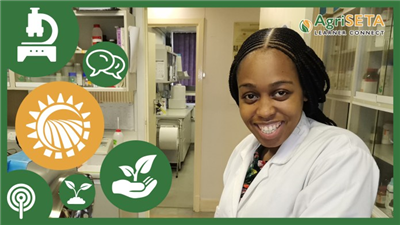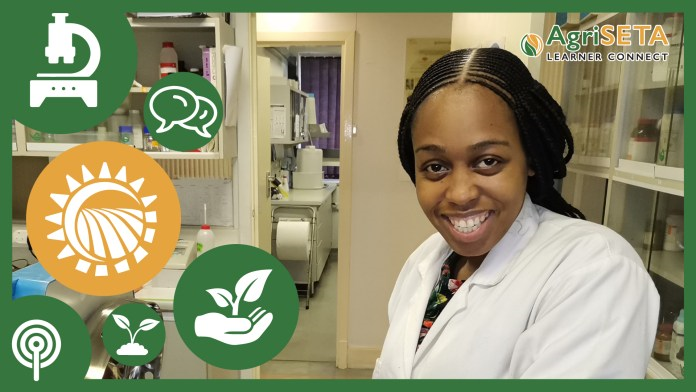AgriSETA Learner Connect: Meet a microbiologist and plant pathologist
Published: Monday, August 17, 2020
Are you brave enough to explore the relationship between science and agriculture?

Nongcebo Sandra Memela (32) never doubted her field of study or career choice. She’s always loved science, and today she is a microbiologist and plant pathologist at the South African Sugarcane Research Institute (SASRI).
Plant pathologists study different plant diseases. A big part of her job is to find innovative solutions to manage and control these diseases. Stepping into Memela’s shoes takes guts and her achievements weren’t just handed to her on a silver platter.
Her zeal and love for science landed her a research scholarship to Germany. Doing field work is one of the best parts of her job. “You get an opportunity to interact with farmers and use your studies to improve their production.”
We need more microbiologists and plant pathologists in Mzansi. Learners, if this career interests you, follow the links below to learn more about making clever study and career moves early in your life. You really don’t need to take our word for it, though. Just listen to AgriSETA Learner Connect on 19 different radio stations or for free on your favourite podcast channels, including Spotify, Apple Podcasts and Google Podcasts. This is an easy way to gain first-hand knowledge on the many cool agricultural careers available.
Ok, now it’s over to Nongcebo Sandra Memela, a microbiologist and plant pathologist at the South African Sugarcane Research Institute (SASRI) for today’s AgriSETA Learner Connect. https://www.foodformzansi.co.za/agriseta-learner-connect-meet-a-microbiologist-and-plant-pathologist/
- Could you sum up your job for us? Exploration, exploration, exploration. I’m a (scientific) researcher. I work with scientists to come up with innovative solutions to control sugarcane diseases (such as red rot) using good micro-organisms.
- So, what does the day-to-day of your job entail? The fun thing is, my job is not limited to one thing. Each day is different. I sometimes work in the laboratory identifying potential biologically controlled micro-organisms. I also work in the glasshouse, field, and also have office work. I work with internship students, training them and improving their work skills.
- What qualification do you need for this career? You’ll need a Bachelor of Science degree majoring in plant pathology or microbiology.
- What are the character traits you need to be great at your job? You need to have an inquisitive mind. Be passionate about improving the livelihoods of people through agriculture. You need to pay attention to detail, have good communication and time management skills.
- What subjects do I need to become a plant pathologist? Biology and/or agricultural science in matric is required with certain prerequisite for admission in these study fields by most institutions.
- What do you love about agriculture as a space to work in? I love the fact that there are so many different careers a person can venture into with a qualification in agriculture. The work you do supports farmers in the country. It improves the growth and production of crops. The work is not just limited to being in the office, you get an opportunity to interact with farmers and use your studies to improve their production.
- Don’t be modest, tell us about your proudest career moments? When I got a scholarship to conduct some of my research in Germany (was a proud moment). I stayed there for 11 months and got an opportunity to attend and present my work at a number of conferences abroad. This shows that studying agriculture can open international opportunities.
- What do you do when you’re not at work? I love nature, being outside and taking walks.
- Any advice for young people who are inspired by your career story here on AgriSETA Learner Connect? Work hard, believe in yourself. Actively look for scholarships and bursaries. Remember, everyone needs agriculture. A hungry engineer or doctor will be very grumpy.
- Where can I study to become an plant pathologist? Plant pathology and microbiology are degree options offered at most universities in South Africa. To equip students with a broader background, plant pathology may be combined as major with entomology, plant breeding, soil science or agronomy. In addition to a rewarding training programme, most departments of plant sciences offer excellent research facilities. Students can also take part in exchange agreements with overseas universities and acquires credit for courses completed at these universities. To become a plant pathologist, you can follow any of these qualifications: BSc Agric (four years), BScAgricHons (one year), MScAgric or your PhD.
How to listen to AgriSETA Learner Connect:
Option 1: Click here to listen on Spotify (all mobile and other devices).
Option 2: Click here to listen on any Apple device.
Option 3: Click here to listen on Google Podcasts.
